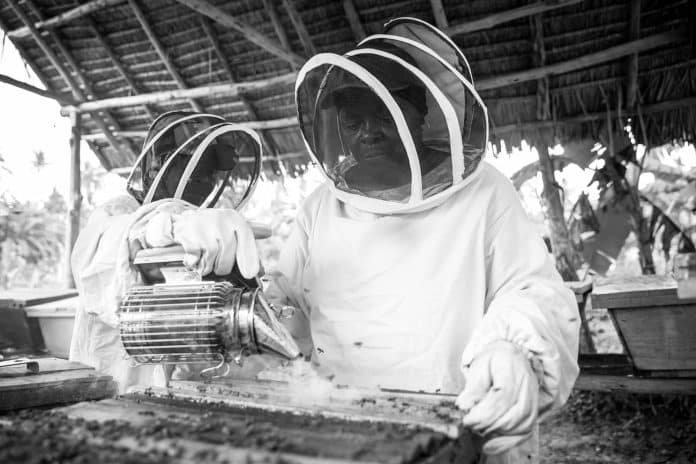A Quick Snapshot of Beekeeping Tanzania
Overview of the Beekeeping Industry in Tanzania
Beekeeping has been practiced in Tanzania for a long time, thanks to the country’s abundance of pollen, including Zea mays, Kotschya, Eucalyptus, Syzygium, Helianthus, Diervillee, and Citrus. Despite these factors, the output of Beekeeping Tanzania is still confined and unable to meet the domestic demand. Small-scale beekeepers often combine their hobbies with their day jobs in the agriculture industry.
One of Tanzania’s most common bee species is Apis mellifera scutellata. Log hives, which are 80-150 cm long and opened lengthwise, raise bee colonies. The interiors of the hives are dug out, and the lids are then tied up with liana twine. To let the bees in, a hole is drilled in the top. Hanging hives from six-meter trees is a common practice. Old circular jars with diameters of 60–80 cm are used by Beekeeping Tanzania personnel with little experience and are placed upside down in bushes for bee admission. Beeswax smeared on the hive’s entrance or inside the hive attracts natural swarms, which populate both types of hives. Swarming bees are not a problem for local beekeepers, who do not capture them. After the bees have entered the hive, the beekeeper visits the hive to collect the honey.
All of the men in the hamlet are involved in harvesting, making it an important social time for the community. To avoid being stung, ill-equipped, and inexperienced Tanzanian beekeepers collect honey at night. Smoke from dry-burning plants also deters bees.
Confusion often ensues since harvesting must be accomplished as rapidly as possible. Honey and brood combs can be collected simultaneously, or the combs might be smashed.
No special care is required for the health risk of the act of Beekeeping Tanzania the Apis mellifera scutellata because it is immune to diseases, unlike European and American foulbrood, var- roosis, and nosema.
Bees hives’ true enemies are badgers, infatuated with honey, and stinging ants, known locally as “Siafu.” The bees are forced to abandon the hive due to comb destruction and honey theft by these ants or the badger.
Beekeepers in the Beekeeping Tanzania industry use cloths drenched in smelly chemicals to try and guard their hives against siafu. Hanging the hives from trees is the most effective way to keep badgers away from your beehives.
In Tanzania, working with bee products is often simple because proper beekeeping equipment is lacking. Boiling or sifting the combs is one method of extracting honey. The honey gets contaminated by pollen and brood from both methods. It rises to the surface and is purified after being removed by boiling; It is collected in a filter made of a plastic bag squashed between two sticks. Pigs are fed on the discarded materials.
Honey is a rare treat among the Beekeeping Tanzania natives, who avoid it because they believe it causes nausea. On the other hand, Maize meal is consumed in large quantities with honey.
Beekeepers are paid around 0.4 USD per kilogram of honey sold to city-based honey shops. Tins of 400gram local honey are offered for 2.5 USD, whereas jars of American, Kenyan, or Italian honey are sold for 2.5-3.4 dollars/250 -500gram, respectively.
Although beekeepers don’t utilize the wax, they sell it to traders for 1.7 USD each kilogram.
In addition to honey sold is “Propolis,” a product produced by Meliponae stingless bees.
It’s important to note that all the Beekeeping Tanzania selling prices listed here are in 1996 USD.
Other Important Things to Know About Beekeeping Tanzania
- Beekeeping companies in Tanzania:
- UMMY HONEY COMPANY Ltd
- TANZANIA INTERNATIONAL BEE CO LTD
- Worker Bees Africa
- SaKi-5 Honey
- Beekeeping Hub
- Afrilife Products
- Central Park Bees Limited
- ASANTE NYUKI PRODUCTS
- Maasai Honey Headquarters
- Yuaja Beekeeping Services and Products
- Afrilife Honey
- Tanzania Honey bee venom
- Buyuni Redd Farms
- Buyuni Bee
- For a full list, visit Google Bee companies in Tanzania
- Beekeeping project in Tanzania – There are numerous of them, but the one that usually stand out the most is the Maasai Honey project because it is integrated into tourism too. You can learn more about this at https://www.maasaihoney.org/
Outside the existing and actively running projects, there are numerous companies and individuals who interested in developing this sector. If you are one of them, do some research with the government of Tanzania on how and where to send your beekeeping project proposal in Tanzania.
For more Agriculture in Tanzania articles click here!


































